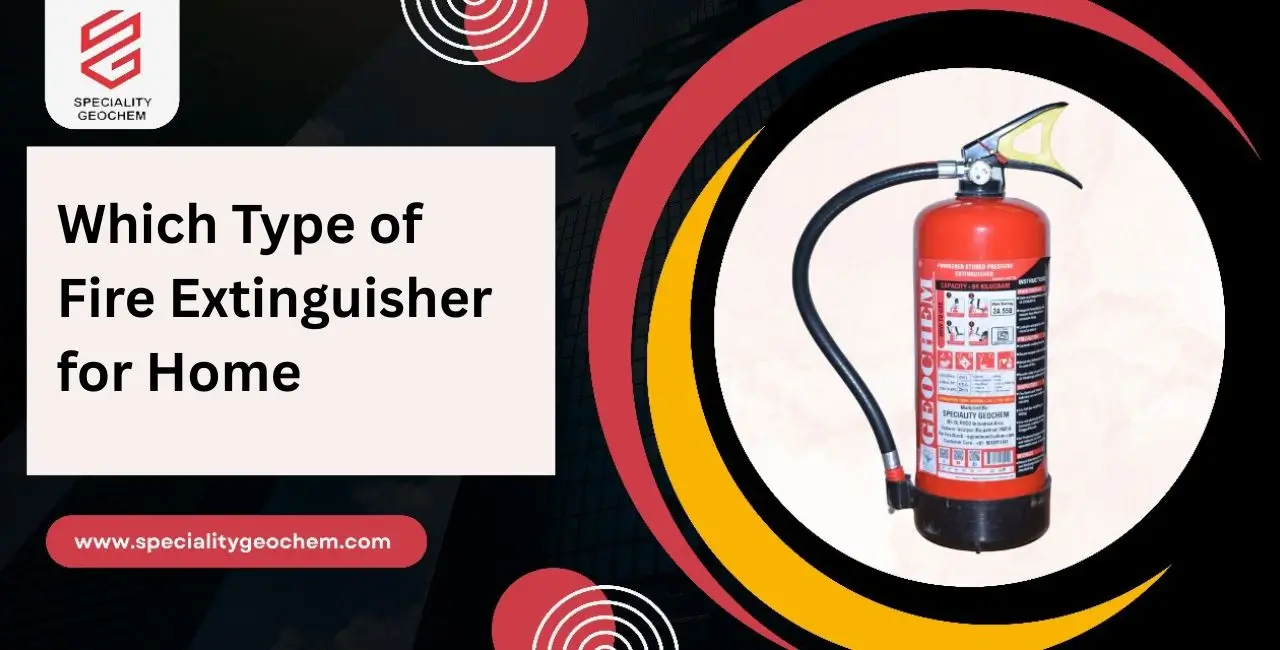which type of fire extinguisher for home: Fire safety is one of the most important aspects of protecting your family and property. While smoke detectors provide an early warning, a fire extinguisher is your first line of defense when flames break out. Many homeowners, however, often wonder: which type of fire extinguisher for home is best?
Not all fires are the same—some are caused by wood or paper, while others start from cooking oils, electrical appliances, or flammable liquids. Because of this, different extinguishers are designed to handle specific classes of fire. This guide will help you understand the various types of fire extinguishers, their uses, and how to choose the right one for your home.
Understanding Fire Classes
Before choosing the correct extinguisher, it’s essential to know the classes of fire:
- Class A – Fires caused by ordinary combustibles such as paper, wood, and cloth.
- Class B – Fires involving flammable liquids like petrol, paint, or kerosene.
- Class C – Fires caused by electrical equipment such as wiring, appliances, and circuit breakers.
- Class D – Fires involving combustible metals (rare in homes but possible in workshops).
- Class K – Fires from cooking oils and fats, most common in kitchens.
Each extinguisher is labeled according to the fire class it is suitable for. Knowing these categories will help you identify which type of fire extinguisher for home use makes the most sense.
Types of Fire Extinguishers for Homes
1. Water-Based Extinguishers (Class A)
Water extinguishers are the most basic type and are ideal for Class A fires. They work by cooling burning materials like wood, fabric, or paper.
- Best Use: Living rooms, bedrooms, or areas with furniture and fabric.
- Avoid Using On: Electrical or kitchen fires, as water can spread flames or cause electrocution.
2. Foam Extinguishers (Class A & B)
Foam extinguishers are versatile and can tackle both Class A and Class B fires. The foam forms a blanket over burning liquid, cutting off the oxygen supply.
- Best Use: Garages, storage areas, and places with flammable liquids.
- Avoid Using On: Electrical fires, unless specifically marked as safe.
3. Dry Chemical Powder Extinguishers (ABC Type)
Often recommended for home use, dry powder extinguishers are multi-purpose. They are effective against Class A, B, and C fires, making them suitable for most household emergencies.
- Best Use: Whole-house coverage, including living rooms, garages, and workshops.
- Advantages: Affordable, widely available, and effective against multiple fire types.
- Limitation: Creates a powdery residue, which can damage electronics.
4. Carbon Dioxide (CO2) Extinguishers (Class B & C)
CO2 extinguishers are clean and leave no residue, making them ideal for electrical and flammable liquid fires. They displace oxygen, suffocating the fire.
- Best Use: Home offices, near computers, or around appliances.
- Avoid Using On: Fires involving fabric or paper, as CO2 doesn’t effectively cool Class A fires.
5. Wet Chemical Extinguishers (Class K)
Designed specifically for kitchen fires, wet chemical extinguishers are effective against high-temperature cooking oils and fats. They cool and form a soapy layer that prevents re-ignition.
- Best Use: Kitchens and cooking areas.
- Avoid Using On: Electrical fires, unless combined with other ratings.
6. Fire Extinguisher Balls (Automatic Use)
An innovative option is the fire extinguisher ball. These are lightweight, automatic devices that activate upon direct contact with flames, releasing extinguishing powder.
- Best Use: Placed in kitchens, garages, or near electrical panels.
- Advantage: No training required; works automatically.
Which Type of Fire Extinguisher for Home Is Best?
When deciding which extinguisher to buy, consider the following:
- For General Use: A dry powder (ABC type) extinguisher is the most recommended as it covers multiple fire types.
- For Kitchens: Always keep a wet chemical or fire extinguisher ball for cooking-related fires.
- For Electrical Areas: A CO2 extinguisher is a safe choice to avoid damaging appliances.
- For Garages or Workshops: Foam extinguishers can handle liquid-based fires.
In most homes, having at least two extinguishers—an ABC powder extinguisher and a kitchen-specific extinguisher—is a smart approach.
Key Tips for Home Fire Safety
Placement of Fire Extinguishers
- Install extinguishers in accessible locations like the kitchen, living room, garage, and near stairways.
- Avoid placing them too close to potential fire sources (like stoves), so you can access them safely.
Maintenance and Checks
- Check pressure gauges regularly.
- Ensure seals and safety pins are intact.
- Replace or recharge expired extinguishers immediately.
Training and Awareness
- Everyone in the household should know the PASS technique:
- Pull the pin
- Aim at the base of the fire
- Squeeze the handle
- Sweep side to side
Common Mistakes to Avoid
- Using water extinguishers on electrical or oil fires.
- Keeping only one extinguisher for the entire house.
- Forgetting to check expiry dates and pressure levels.
- Placing extinguishers out of reach or in hidden spots.
Conclusion: which type of fire extinguisher for home
Understanding which type of fire extinguisher is best for your home is more than just a precaution—it is an essential step toward safeguarding lives and property. A balanced mix of ABC powder extinguishers for general hazards, wet chemical extinguishers for kitchens, and CO₂ extinguishers for electrical safety ensures that every potential fire risk is effectively covered. Beyond equipment, the real value lies in awareness, timely action, and preparedness.
At Speciality Geochem, we believe fire safety is a responsibility that every household should prioritize. Our wide range of certified fire safety products is designed to make protection accessible, reliable, and easy to use. By investing in the right extinguishers, maintaining them regularly, and ensuring your family understands their use, you create a safer living environment with confidence. Trust Speciality Geochem to deliver quality fire safety solutions that bring peace of mind and long-term protection.

